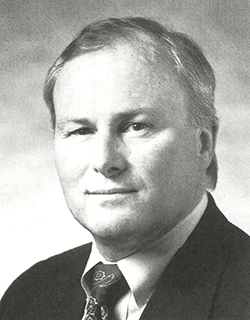UW may drop Slavic languages, environmental studies due to budget woes

Arts and Sciences Dean John Simpson
UW deans decided April 7 to eliminate the Department of Slavic Languages and Literature and the Institute for Environmental Studies, responding to a state directive to plan for a 2.4 percent reduction in the UW’s 1995-97 budget.
In addition, the School of Communications will lose its undergraduate programs in advertising, public relations and broadcast journalism. The Department of Speech Communication will lose a graduate program in oral interpretation and support for the debate team.
The Department of Applied Mathematics has been eliminated, though its Ph.D. program will move to the Graduate School. Master’s degree programs in systematic musicology and radiological sciences will be dropped. The cuts are scheduled to take effect July 1.
During the winter and early spring, committees of faculty and students reviewed programs slated for cuts. Their reports urged retaining all programs except systematic musicology and radiological sciences.
In making their decisions, the deans followed procedures in the University Handbook, basing their actions on the quality of the program, the “centrality” of the program to the mission of the college, and the instructional contribution of the program.
Faculty and students in these units may appeal the deans’ actions to the Faculty Senate. Members of communications, Slavic languages and environmental studies have appealed. Once a request is filed, an appeals review board will have 30 days to prepare its own report to the President. Any final program elimination must be approved by the President and the Board of Regents.
Undergraduate students in affected programs will be given a reasonable time to complete their degree. Options for graduate students have been developed by the Graduate School Council. Tenured faculty in affected units will remain at the University; however, they may be transferred to other departments. Non-tenured faculty and staff positions in these departments will be eliminated.
If the deans’ decisions are carried out, the total amount saved by these program eliminations would be about $6.4 million. Over time, about 35 full-time faculty positions would be cut, along with 15 full-time TA/RA positions and 10 full-time staff spots. The cuts come on top of other steps already taken to reduce the UW budget, including closing some library branches, consolidating nursing programs, eliminating an education Ph.D. specialty and cutting more than 40 support staff positions.
President William P. Gerberding commended the deans for the difficult decisions they made after their initial program elimination proposals. “This process has been very painful and divisive. It is now entering another phase, and I will review the deans’ decisions carefully. Appeals may be filed, prompting the creation of appeal review boards. There remain many unknowns,” he said.
In a letter outlining his decision, Arts and Sciences Dean John Simpson wrote that the process has been “extremely difficult,” and that each program reviewed “has considerable scholarly and/or pedagogical merit. … However, I am charged with eliminating 3 percent of our state-supported budget.”
Simpson wrote that the present framework for Slavic languages and literature is “unnecessary” and “too large for its instructional responsibilities.” The college will retain courses in Russian and other Slavic languages and in Russian and Slavic culture, “probably reconfigured as part of another department.”
Faculty and students in the department were stunned by the decision. “It is my conviction that they intended to eliminate Slavic from the beginning,” Slavic Languages Chair Karl Kramer told the press. “Within a couple of years, Slavic studies at the UW will be dead.”
Graduate School Acting Dean Dale Johnson decided to eliminate the Institute for Environmental Studies (IES), suggesting that a task force be established to “determine the best way for the University to proceed.” The elimination “does not represent a reduction in the University’s interest in or commitment to educational and research opportunities related to the environment,” he stated. Currently the UW does not offer a specific degree in environmental studies and Johnson suggested the task force consider that option.
Environmental Studies Director James Karr expects at least 10 appeals to filed by students and faculty in his program. He feels the IES review panel has already vindicated the institute. “That committee gave the first positive review of IES in over a decade. Despite that new information, the higher administration sustained their decision,” he said.
In other reductions, Arts and Sciences Dean Simpson decided to drop advertising, public relations and broadcast journalism from the communications school because they are “less appropriate or central to the liberal arts and science educational objectives of the college.”
Communications Director Ed Bassett said, “We are absolutely going to appeal the whole process. We didn’t think they would cut that deeply. We need some restoration to teach some semblance of those topics.”
Dean Simpson wrote that speech communication “can continue its main thrust of undergraduate education with fewer resources and a more focused graduate program.” He said the emphasis in oral interpretation will be cut and that the size of the faculty will be reduced in the future.
Speech Communication Chair Thomas Scheidel said the review committee called his department an “underappreciated treasure” in the college with “probably the best” integration of faculty research, graduate student training and undergrad instruction. “The dean and the college council disregarded this positive review and cut only the programs they identified in the first place,” Scheidel said. “They cut this ‘underappreciated treasure’ by 28 percent.”
Simpson said moving applied mathematics to the Graduate School would preserve the “high quality of the research and graduate training activities.” All students in applied math are at the graduate level.